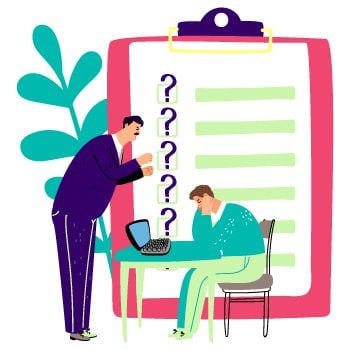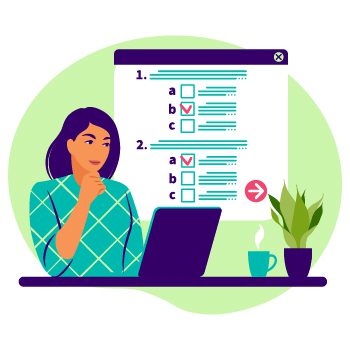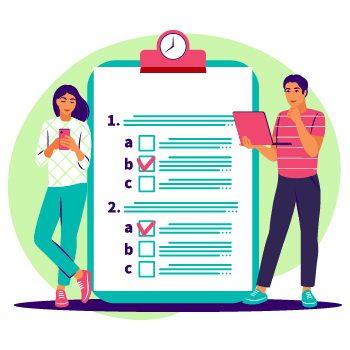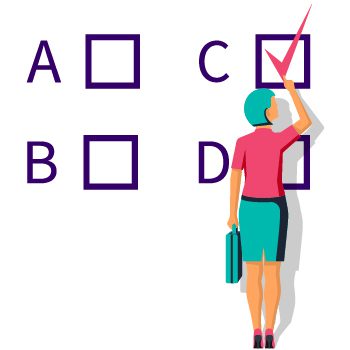
The Citizen Test Questions and Answers
What is the Citizen Test?
The Citizen Test is a test that assesses an individual’s knowledge of American history, government, and laws. This test is a crucial component of the naturalization interview, which is required for individuals seeking to become United States citizens. The Citizen Test comprises the Civics Portion and the English Portion. The Civics Portion consists of 100 Civics Questions about American government and history, while the English Portion assesses an individual’s proficiency in the English language. The Reading Portion involves reading a sentence in English and answering a question about it, while the Writing Portion involves writing a sentence in English. Some topics covered in the Civics Question portion of the test include the Federal Government, George Washington, American history, and the American government. Other Civics Test Questions cover concepts like political liberty, freedom of speech, religious freedom, and the pursuit of happiness. It is important to note that the Citizen Test is not just a simple multiple-choice test. During the Citizenship Interview, a government official will ask an individual several Citizenship Test Questions orally, and the individual must respond with the correct answer in English.
Overall, the Citizen Test is a critical component of the naturalization process. It serves as a means to ensure that individuals who become citizens of the United States have a basic understanding of American history, government, and laws.

Why is the Citizen Test Important?
The Citizen Test is essential to becoming a naturalized citizen in the United States. It serves as a way to determine an applicant’s understanding of the country’s history, government, and laws. By passing this test, the applicant proves they have a strong foundation of knowledge necessary to become a productive and engaged member of society.
The citizenship exam is crucial as it assesses applicants’ understanding of basic rights, the rule of law, and the executive branch, ensuring green card holders in states like North Carolina and Rhode Island know the principles underlying the capitalist economy and market economy. Additionally, it evaluates familiarity with major events in U.S. history, civil rights, and freedom of expression, safeguarding against racial discrimination and promoting freedom of religion as integral aspects of the application process for naturalization.
Furthermore, the Citizen Test is essential in safeguarding the nation’s democracy. It ensures that those with citizenship in the United States have a fundamental understanding of their rights and responsibilities as American citizens. Additionally, the Citizen Test promotes a better understanding of the country’s government, its various branches, and its roles and functions. Citizenship is a vital part of the American Dream, which includes the Pursuit of Happiness and the chance to achieve personal fulfillment. The Citizen Test represents a pathway towards that dream and a way for individuals to participate in the American way of life fully. It enables people to vote, run for public office, and contribute to society in various ways.
Ultimately, the Citizen Test plays a critical role in the United States democracy by ensuring citizens are informed, engaged, and empowered to participate in the democratic process. By studying for and passing the Citizen Test, new citizens can be confident that they are taking an essential step towards being able to participate in all aspects of American life. Read more about green card marriage interview questions and answers.

What are the Questions on the Citizen Test?
The Citizen Test includes questions on various topics related to the U.S. government and history. The questions are designed to test the applicant’s knowledge of basic civics, including the rights and responsibilities of citizenship, the structure of the federal government, and the principles on which the country was founded. For example, one question might ask which branch of government is responsible for interpreting the law. The answer would be the judiciary branch, which includes the Supreme Court and other federal courts. Another question might be about the famous phrase in the Declaration of Independence, “Life, Liberty, and the Pursuit of Happiness.” The correct answer would be that this phrase represents the three unalienable rights all people are entitled to, according to the Founding Fathers. Other questions might include the process for amending the Constitution, the President’s and Congress’s roles, or the basic principles of democracy and freedom of speech. Overall, the Citizen Test covers a range of important topics essential for understanding how the U.S. government functions and the rights and responsibilities of citizenship. Citizenship updates are periodically incorporated into the test to reflect changes in laws and governmental practices.
Ultimately, the Citizen Test plays a critical role in the United States democracy by ensuring citizens are informed, engaged, and empowered to participate in the democratic process. By studying for and passing the Citizen Test, new citizens can be confident that they are taking an essential step towards being able to participate in all aspects of American life.
How is the Citizen Test Scored?
The citizen test is scored based on various factors, including English skills, understanding of the executive and legislative branches, knowledge of original colonies and the civil rights movement, and awareness of federal election processes and leaders. Additionally, familiarity with key historical events such as the suffrage movement and the end of British rule is assessed. Immigration lawyers advise applicants on the application for naturalization and ensure compliance with federal income tax forms. Furthermore, applicants must demonstrate comprehension of federal office roles, including Homeland Security, and awareness of territories like the Mariana Islands and the Virgin Islands. The test evaluates whether candidates grasp the significance of Liberty Island and the District of Columbia, along with recognizing official lists and the contributions of Native Americans. The oral exam component, overseen by the citizenship coordinator, is also crucial in assessing applicants’ understanding and readiness for citizenship.
The Citizen Test is a pass-or-fail test. You must get at least 60% of the questions correct to pass the test. The test is composed of 100 questions, and the questions are randomly chosen. Each question has one right answer. The test is designed to assess your knowledge of American history and government. It’s important to note that passing the Citizen Test is a critical step in achieving the American Dream. In the United States, there is a belief in the “pursuit of happiness,” and the ability to become a citizen is a significant milestone. Passing the Citizen Test demonstrates your knowledge and understanding of the principles that make America great. The time you must wait varies depending on your situation, but typically, it is around 90 days. The Citizen Test is an opportunity to showcase American history and government knowledge. It’s essential to take the time to study and understand the questions. While it may be challenging, it is achievable. With hard work and determination, you can pass the test and become a proud citizen of the United States.
Can You Study for the Citizen Test?
Yes, you can study for the Citizen Test. Preparing for the test is crucial if you want to pass it. As mentioned earlier, the Citizen Test evaluates your knowledge of the United States government and history, which means that studying these topics will help you increase your chances of passing.
Fortunately, there are various resources available that can help you study for the Citizen Test. You can start by reviewing the U.S. Citizenship and Immigration Services (USCIS) website, which provides study materials, practice tests, and other helpful information. Additionally, there are many online resources, books, and study guides that you can use to improve your understanding of the topics covered on the Citizen Test. In addition to studying the necessary content, you can use specific strategies to help you pass the Citizen Test. For instance, you can focus on memorizing essential dates and historical events, reviewing key government processes, and paying attention to specific details about the Constitution and the Declaration of Independence.
Ultimately, remember that the Citizen Test is designed to test your knowledge and understanding of the United States government and history. Therefore, studying for it is about passing the test and understanding the country you want to call home. By putting in the time and effort to study for the Citizen Test, you are taking an essential step in your pursuit of happiness and success as a citizen of the United States.

Sample Citizen Test Questions and Answers
- Question: What is the capital city of the United States?
Answer: Washington, D.C. - Question: Who is the current President/Prime Minister of [Country]?
Answer: The answer will vary depending on the country and its current leadership. - Question: What is the significance of [Country’s National Flag]?
Answer: The significance of the national flag varies from country to country. Provide the specific relevance to the country being discussed. - Question: What are the three branches of government?
Answer: The executive, legislative, and judicial branches. - Question: Who has the power to declare war in [Country]?
Answer: The power to declare war usually rests with the legislative branch of government, such as the parliament or Congress. - Question: What are the three main political parties in [Country]?
Answer: The three main political parties can vary depending on the country. Provide the specific parties for the country being discussed. - Question: What is the supreme law of the land in [Country]?
Answer: The Constitution is usually considered the supreme law of the land in most countries. - Question: Name three fundamental rights the [Country’s] constitution protects.
Answer: The answer will vary depending on the country and its constitutional rights. Provide three examples for the country being discussed. - Question: What is the official language of [Country]?
Answer: The official language can vary from country to country. Provide the specific official language for the country being discussed. - Question: Who is the head of state in a constitutional monarchy?
Answer: In a constitutional monarchy, the head of state is usually a monarch or king/queen who holds a ceremonial role with limited or no political power. - Question: What are the national holidays in [Country]?
Answer: The national holidays can vary depending on the country. Provide the specific national holidays for the country being discussed. - Question: Name the three branches of the military in [Country].
Answer: The three military branches can vary depending on the country. Provide the specific branches for the country being discussed. - Question: What is the process of amending the constitution in [Country]?
Answer: Amending the Constitution can vary from country to country. Provide the specific process for the country being discussed. - Question: What are the requirements to vote in [Country]?
Answer: The requirements to vote can vary depending on the country. Provide the specific requirements for the country being discussed. - Question: Who has the power to appoint judges in [Country]?
Answer: The power to appoint judges can vary depending on the country. Provide the specific authority for the country being discussed. - Question: Name the three largest political parties in [Country].
Answer: The three largest political parties can vary depending on the country. Provide the specific parties for the country being discussed. - Question: What does the phrase “separation of powers” mean?
Answer: The separation of powers refers to dividing government responsibilities into distinct branches to ensure a system of checks and balances. - Question: What is the age requirement to run for president/prime minister in [Country]?
Answer: The age requirement to run for president/prime minister can vary depending on the country. Provide the specific age requirement for the country being discussed. - Question: Who has the power to issue pardons in [Country]?
Answer: The power to issue pardons can vary depending on the country. Provide the specific authority for the country being discussed.
As you can see, the questions on the Citizen Test cover various topics, from history and government to economics and current events. Studying and preparing for the test is essential to ensure a passing score. Good luck on your journey toward becoming a United States citizen!

Tips for Passing the Citizen Test
To prepare for the citizen test, naturalization applicants should review laws and historical events, such as the Spanish-American War, while familiarizing themselves with national symbols like the national anthem and understanding the role of Veterans Affairs. Studying key figures like Benjamin Franklin and civil rights leaders can aid in answering the hardest questions on American politics and the presidential election process.
Additionally, creating flashcards on the United States, naturalization civics, and practicing in one’s native language can be helpful tips. Understanding the judicial branch and the Democratic Party’s role in national government, as well as the concept of dual citizenship, is essential for passing the test and recognizing individual rights and the balances of separation and racial segregation in the American system. Consulting with immigration lawyers or a clinical psychologist can provide additional support in navigating the citizenship application process.
- Start studying early: Don’t wait until the last minute to look for the citizen test. Give yourself ample time to review all the material.
- Understand the material: Don’t just memorize the questions and answers. Make sure you understand the concepts behind each question. For example, the “pursuit of happiness” is essential to American culture and history.
- Take practice tests: Practice makes perfect. Take advantage of the many online resources available for citizen test practice.
- Get help if you need it: If you are struggling with any material, seek help from a teacher, tutor, or friend who has already passed the citizenship test.
- Stay calm: Feeling nervous on test day is natural, but stay clear and focused. Remember, you have studied hard, and you know the material.
- Keep the big picture in mind: Passing the citizen test is essential to citizenship, but it is just one step in a more extensive journey. Keep the “pursuit of happiness” and your goals in mind as you work towards achieving your citizenship.
Naturalization Requirements and Preparation Tips
In South Carolina, the naturalization application process involves fulfilling various requirements, including passing the citizenship exam. This exam tests applicants’ knowledge of U.S. history, government, and civic principles, touching on figures like Abraham Lincoln and pivotal moments in American history. Military service may also confer eligibility for expedited naturalization under certain conditions, reflecting the nation’s respect for those who have served. Meeting these requirements is essential for individuals seeking to become U.S. citizens, ensuring they understand and uphold the rights, responsibilities, and values integral to American society.
Flash cards are a valuable tool for preparing for the naturalization process, aiding in memorizing essential details such as English language requirements and key historical figures like the commander in chief. They help applicants study effectively, ensuring they are well-prepared for the citizenship exam and interview appointment notice. Additionally, flash cards can be useful for understanding legal advice related to the naturalization process and any accommodations, such as extra time, that may be available based on individual needs. By systematically reviewing flash cards, applicants can strengthen their knowledge and confidence in meeting the requirements for naturalization in the United States.
Frequently Asked Questions
What is the Citizen Test?
The Citizen Test, also known as the citizenship test, is designed to assess an individual’s knowledge of a country’s history, government, laws, and values as part of becoming a citizen.
What is the purpose of the Citizen Test?
The purpose of the Citizen Test is to ensure that individuals seeking citizenship have a good understanding of the country’s language, culture, and civic responsibilities. It helps determine if an applicant is ready to become a citizen and actively participate in the country’s society.
What topics are covered in the Citizen Test?
The Citizen Test typically covers a wide range of issues, including the country’s history, government structure, constitution, rights and responsibilities, national symbols, and basic knowledge of the country’s laws and values.
How many questions are there in the Citizen Test?
The number of questions in the Citizen Test can vary depending on the country. In some countries, there might be 10 to 20 questions, while others may have more questions.
How is the Citizen Test administered?
The Citizen Test is usually administered in written form, requiring applicants to answer multiple-choice or short-answer questions. In some cases, it may also be conducted orally, with an immigration officer asking questions directly to the applicant.


Sorry, the comment form is closed at this time.